Yesterday, the ancient privacy coin Monero ($XMR) suddenly erupted after a long period of silence. It surged by 30% in a single day, with the price peaking at $329, reaching a new high since 2021. What is this 11-year-old coin? And why did it suddenly skyrocket?
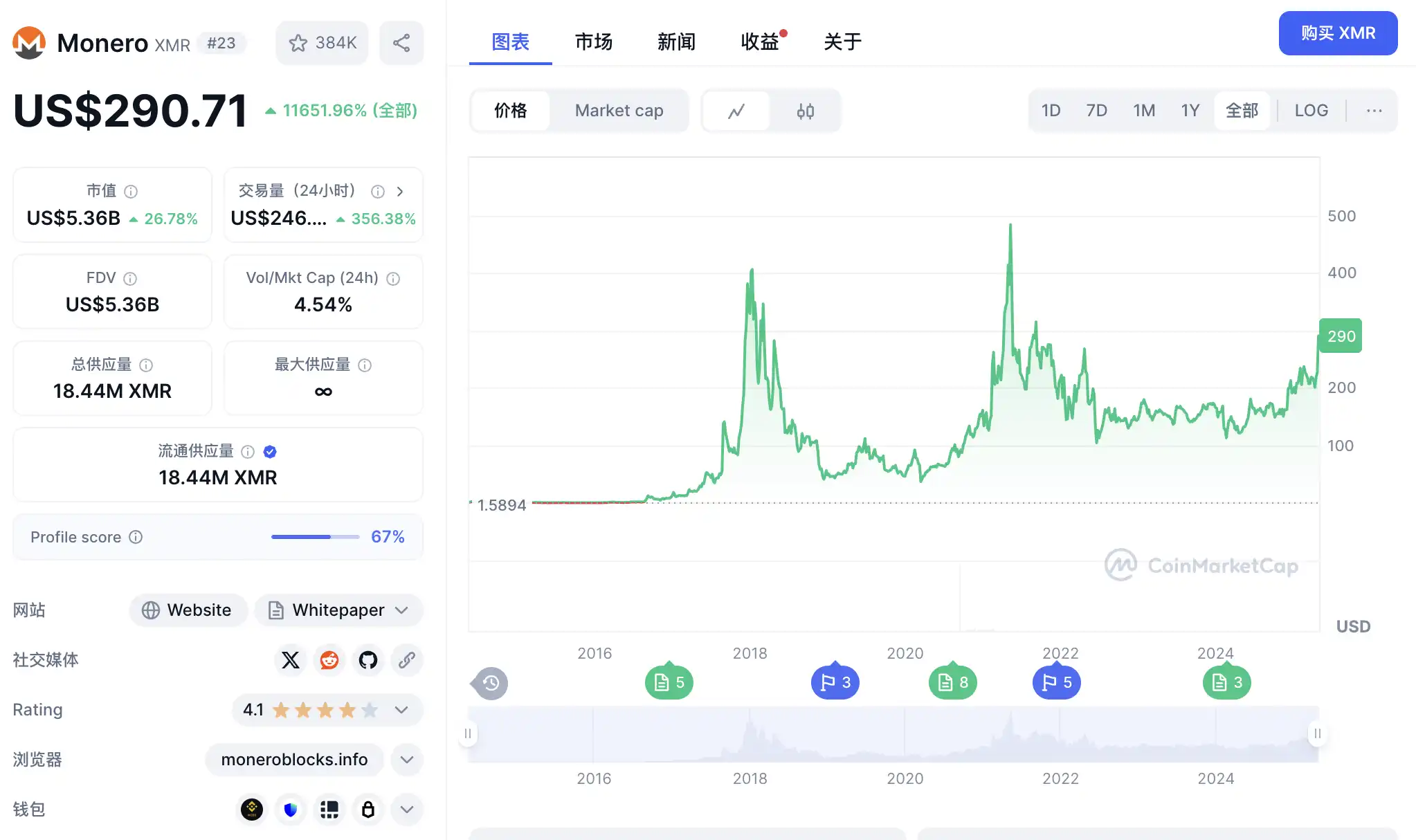
The Most OG Privacy Coin
In 2013, Nicolas van Saberhagen published the "CryptoNote" protocol, and Monero was born on this foundation in April 2014, switching to RandomX in 2019.
Monero uses technologies such as ring signatures, stealth addresses, and RingCT to hide the sender, receiver, and amount of transactions. This high level of anonymity gives it an advantage in privacy protection, and Monero's modular code structure has been praised by Wladimir J. van der Laan, one of the Bitcoin core maintainers.
However, while maintaining privacy, it also makes it difficult to meet regulatory requirements for anti-money laundering (AML) and counter-terrorism financing (CTF). As one of the most well-known privacy coins, it is a token with two sides: on one hand, its focus on privacy, decentralization, and scalability is favored by many who love "liberalism"; on the other hand, it has become a breeding ground for criminals.
Criminals' Favorite
In late summer 2016, following the arrest of Silk Road founder Ross William Ulbricht, law enforcement agencies gained access to Bitcoin tracing technology. Major dark web markets like AlphaBay began to abandon Bitcoin in favor of the harder-to-trace Monero, and North Korean hacker group Lazarus Group also favored using Monero to "clean" assets. This led to Monero's first market cap breakthrough in 2016, rising from $5 million to $185 million, along with rapid growth in trading volume.
2020 was the second hot period for Monero. That year, the terrorist organization ISIS updated its website to show that it no longer accepted Bitcoin donations, switching to the more private token Monero. The reason was that if ISIS's Bitcoin reserves were too large, it would be difficult for the terrorist organization to transfer or cash them out. A report from Chainalysis confirmed this, stating that ISIS held less than $100,000 in Bitcoin, and most other terrorist organizations were in similar situations. In the same year, dark web market sales grew by 70% year-on-year, and Monero became one of the main payment tools due to its privacy features, accounting for 45%, nearly on par with Bitcoin.
With the widespread adoption of "underground transactions," Monero has become notorious for dark web trading, scams, ransom payments, and hacker theft exit paths. In 2020, the price of XMR tokens rose from $50 at the beginning of the year to $150 by the end of the year, reaching $450 by mid-2021.
The Key to Freedom
Although Monero has long been associated with "crime," it is merely a technical tool. The Monero development team has consistently maintained a "code neutrality" stance. They emphasize that "Monero is designed for everyday use by ordinary people; any technology can be abused, just like cash." They do not collaborate with criminal activities and have no connections with criminal organizations.
Therefore, from another perspective, it embodies Bitcoin's "freedom of transaction," gaining support from many who advocate for "liberalism," "privacy above all," and "decentralized resistance to censorship." Many in the community believe it is the true Bitcoin.
John McAfee, the founder of the first antivirus software, is one of them. He stated, "Monero is one of the truly anonymous cryptocurrencies, while Bitcoin is not truly anonymous." He expressed his recognition of Monero's technical strength and privacy features on multiple occasions during his lifetime. The anonymity and untraceability of Monero align closely with McAfee's long-advocated concept of "privacy liberalism."
Even "Bitcoin Jesus" Roger Ver "defected." In his first public interview after being released on bail in 2024, he stated that he decided to abandon Bitcoin in favor of tokens like Monero that can provide more privacy. "Nowadays, most people are using custodial wallets, which are not really wallets at all, just accounts, and their privacy is no better than your account at a U.S. bank or PayPal. But fortunately, there are other cryptocurrencies like Monero that can provide more privacy protection."
In regions active in cryptocurrency, some e-commerce or independent merchants accept Monero as a payment method, such as some tech-related online stores (hardware wallets or cryptocurrency peripheral technology products) or offline retail stores. Community member Schmidt even shared a receipt showing his purchase of low-fat organic cocoa drink at Spar using Monero.
Note: SPAR is one of the largest food retail chains in the world, founded in the Netherlands in 1932 by Adriaan van Well. It has over 13,900 stores in 48 countries. The community member's purchase was made at a store in Kreuzlingen, Switzerland, which has gained attention for accepting cryptocurrencies like Bitcoin and Monero.
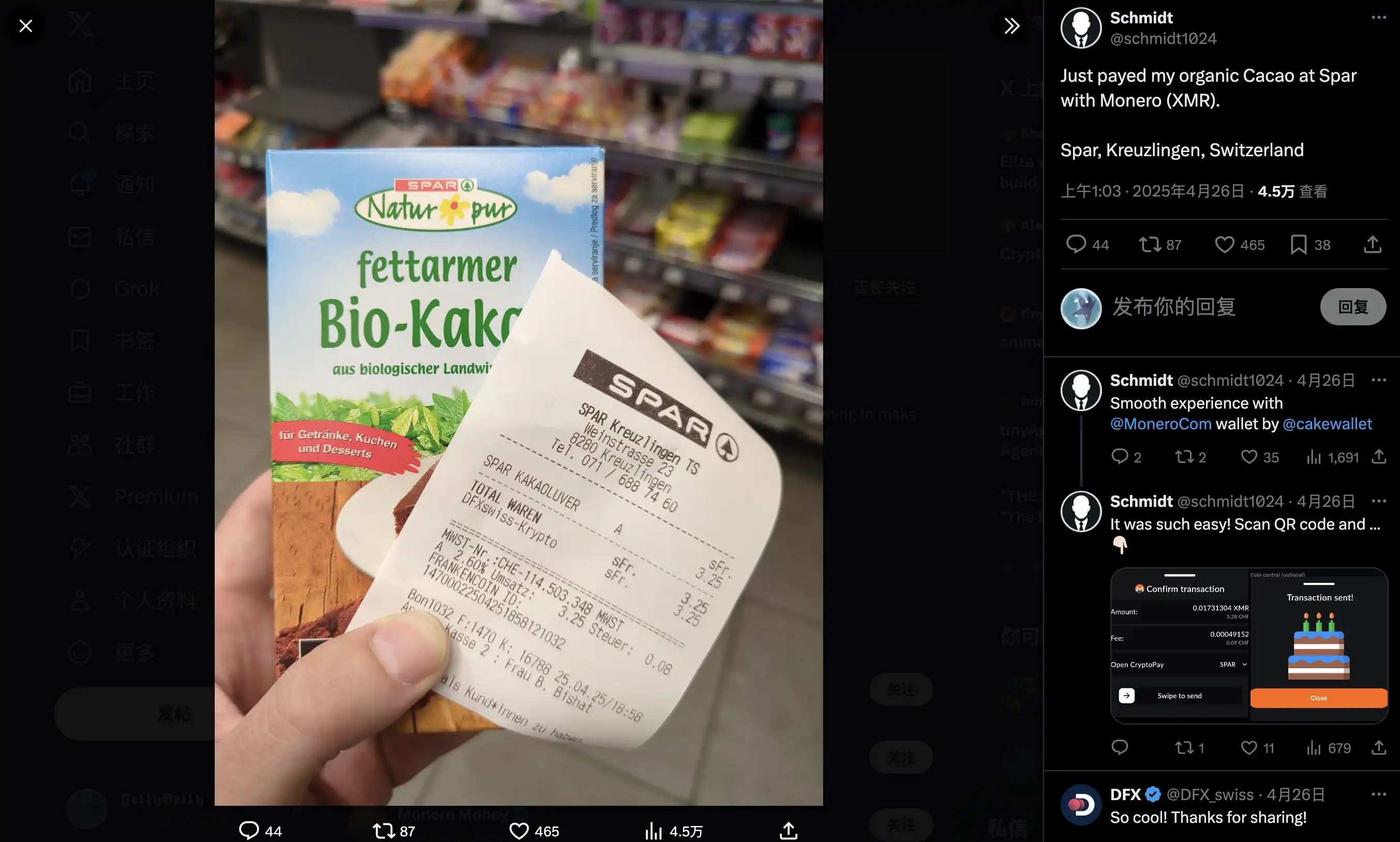
When the comment section labeled Monero as a cryptocurrency used for "money laundering," well-known on-chain detective ZachXBT rebutted, "No, I often use Monero for payments," indicating that he is also a fan of Monero.
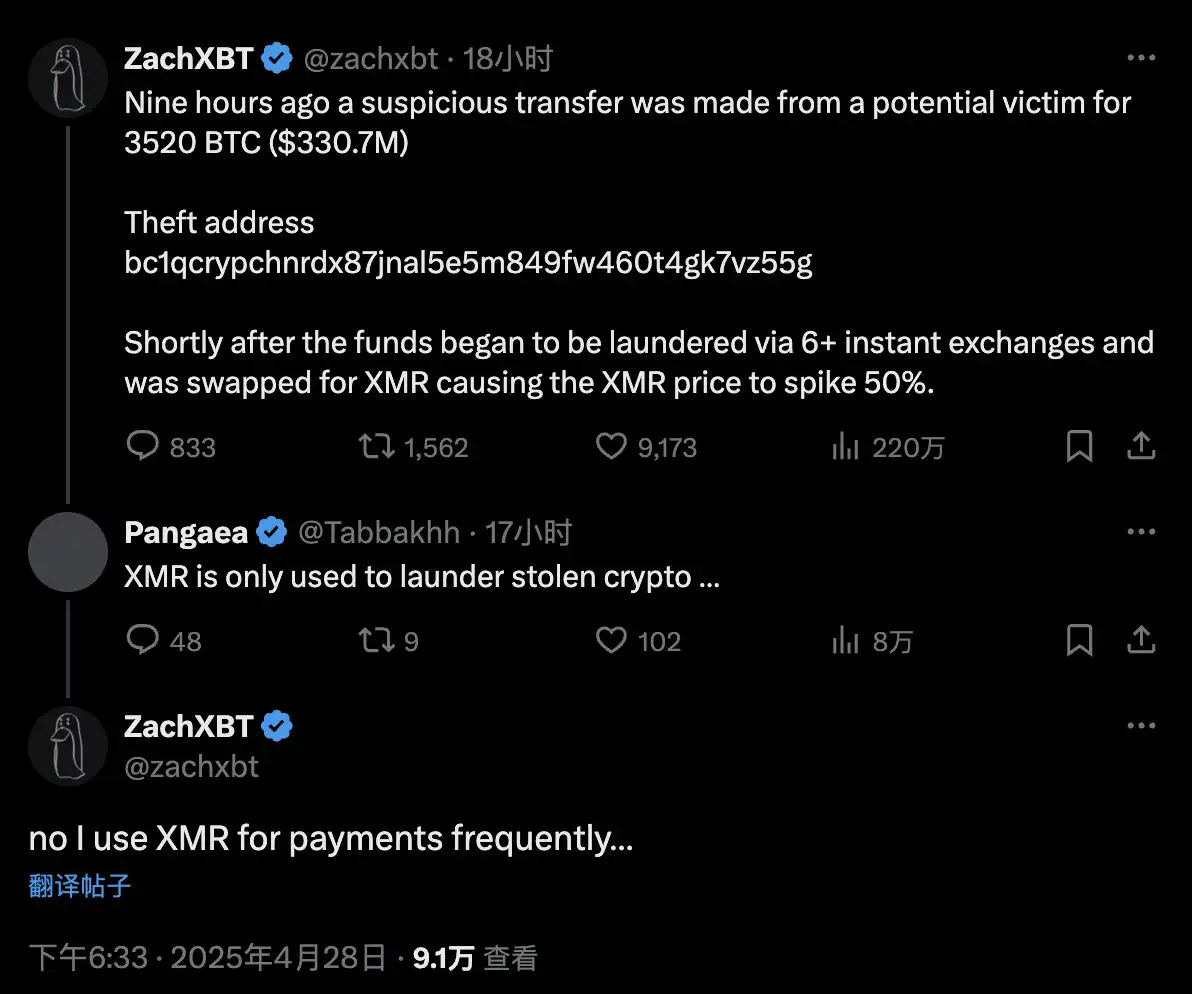
Temporary Pump or Value Discovery?
Inflow of Stolen Funds
On social media, on-chain detective ZachXBT stated, "Nine hours ago, a suspicious transfer occurred at a certain address, amounting to 3,520 Bitcoins (approximately $330.7 million). Subsequently, these funds began to be laundered through more than six instant trading platforms and were exchanged for Monero, causing the price of Monero to soar by 50%."
This also led to a large number of short contracts for the token being liquidated, forcing traders to repurchase assets, further increasing upward pressure based on the growing spot demand. These combined factors may have contributed to Monero's recent sudden rise.
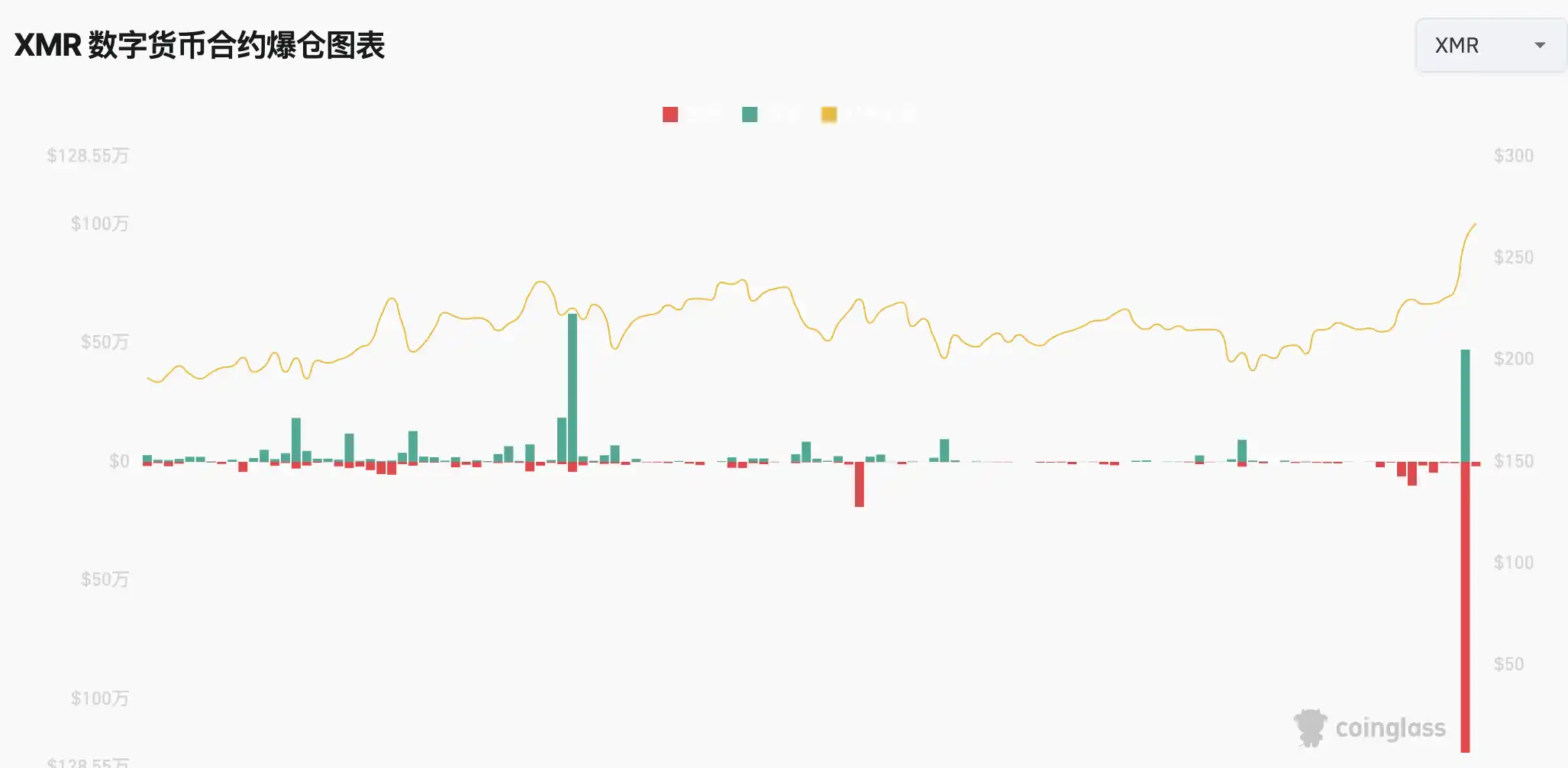
Positive Project Developments
Some analysts believe that the growing anticipation for Monero's EP159 and EP160 upgrade proposals is also one of the factors behind this rise. These proposals could make Monero more compliant-friendly, allowing users to provide proof of transaction validity without exposing sensitive personal information. The community believes this upgrade may allow Monero, which was delisted from major CEXs after the EU updated its anti-money laundering regulations in 2024, to be relisted on compliant top CEXs like Binance and Coinbase.
Additionally, the first DeFi project in the Monero ecosystem, Tari, is set to launch its mainnet on May 6, planning to merge mine with Monero. Many in the Monero community are very much looking forward to the emergence of this project.
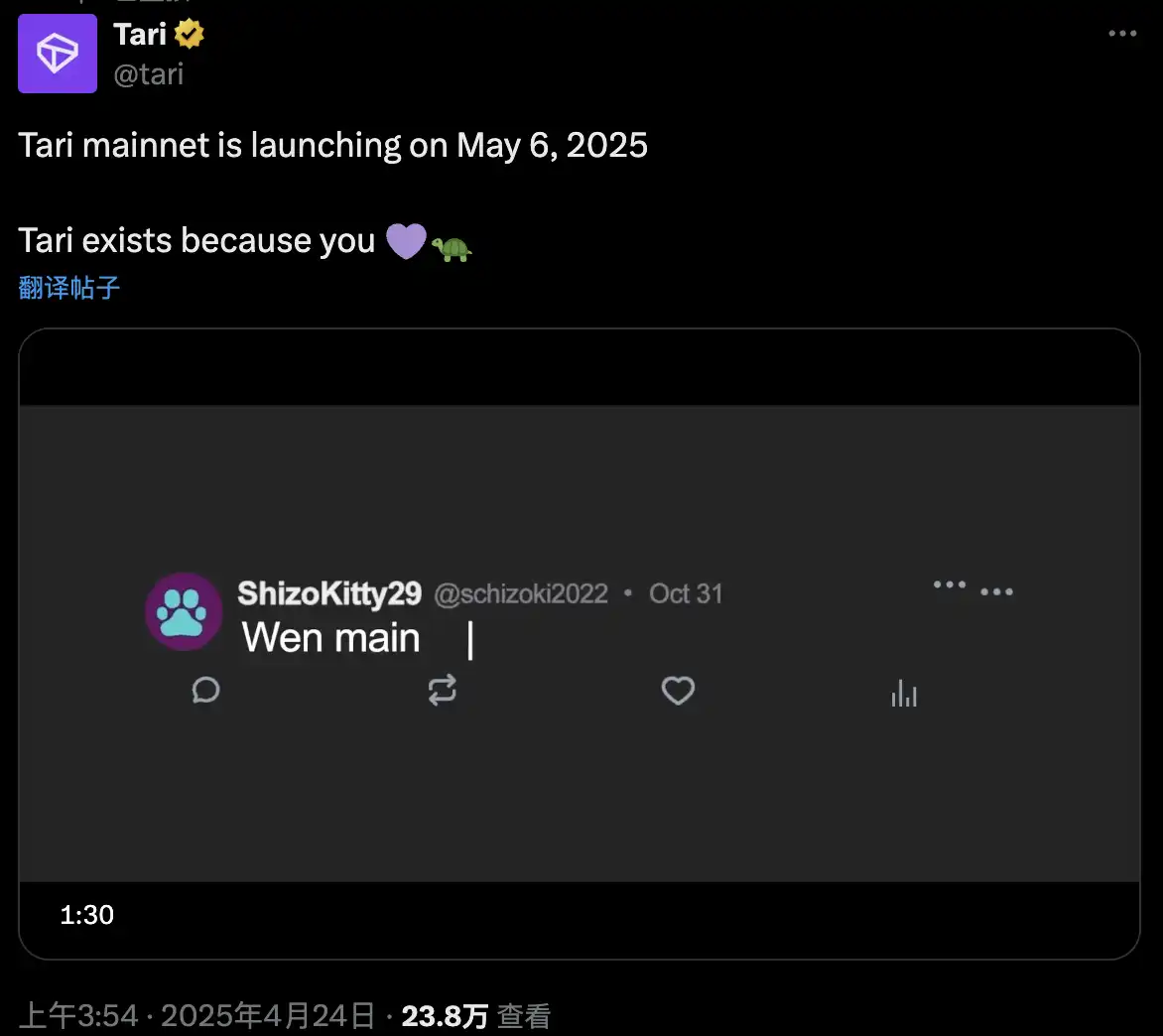
Once a tool is created, the concepts of good and evil imbue it with more meanings. Monero is like a microcosm of cryptocurrency, weighing between "freedom" and "regulation," oscillating between "human rights" and "crime." The goodness and malice of human nature are infinitely magnified here, much like Einstein's comment on the atomic bomb: "Science and technology are a double-edged sword; they can benefit humanity or destroy the world."
免责声明:本文章仅代表作者个人观点,不代表本平台的立场和观点。本文章仅供信息分享,不构成对任何人的任何投资建议。用户与作者之间的任何争议,与本平台无关。如网页中刊载的文章或图片涉及侵权,请提供相关的权利证明和身份证明发送邮件到support@aicoin.com,本平台相关工作人员将会进行核查。




